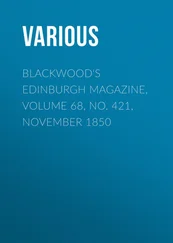Various - Blackwood's Edinburgh Magazine, Vol. 66, No 409, November 1849
Здесь есть возможность читать онлайн «Various - Blackwood's Edinburgh Magazine, Vol. 66, No 409, November 1849» — ознакомительный отрывок электронной книги совершенно бесплатно, а после прочтения отрывка купить полную версию. В некоторых случаях можно слушать аудио, скачать через торрент в формате fb2 и присутствует краткое содержание. Издательство: Иностранный паблик, Жанр: periodic, foreign_edu, Путешествия и география, на английском языке. Описание произведения, (предисловие) а так же отзывы посетителей доступны на портале библиотеки ЛибКат.
- Название:Blackwood's Edinburgh Magazine, Vol. 66, No 409, November 1849
- Автор:
- Издательство:Иностранный паблик
- Жанр:
- Год:неизвестен
- ISBN:нет данных
- Рейтинг книги:3 / 5. Голосов: 1
-
Избранное:Добавить в избранное
- Отзывы:
-
Ваша оценка:
- 60
- 1
- 2
- 3
- 4
- 5
Blackwood's Edinburgh Magazine, Vol. 66, No 409, November 1849: краткое содержание, описание и аннотация
Предлагаем к чтению аннотацию, описание, краткое содержание или предисловие (зависит от того, что написал сам автор книги «Blackwood's Edinburgh Magazine, Vol. 66, No 409, November 1849»). Если вы не нашли необходимую информацию о книге — напишите в комментариях, мы постараемся отыскать её.
Blackwood's Edinburgh Magazine, Vol. 66, No 409, November 1849 — читать онлайн ознакомительный отрывок
Ниже представлен текст книги, разбитый по страницам. Система сохранения места последней прочитанной страницы, позволяет с удобством читать онлайн бесплатно книгу «Blackwood's Edinburgh Magazine, Vol. 66, No 409, November 1849», без необходимости каждый раз заново искать на чём Вы остановились. Поставьте закладку, и сможете в любой момент перейти на страницу, на которой закончили чтение.
Интервал:
Закладка:
The immense expense with which the maintenance of such prodigious numbers of prisoners in jail is attended, is another most serious evil, especially in these days of retrenchment, diminished profits, and economy. From the last Report of the Jail Commissioners for Scotland – that for 1848 – it appears that the average cost of each prisoner over the whole country for a year, after deducting his earnings in confinement, is £16, 7s. 6d. As this is the cost after labour has been generally introduced into prisons, and the greatest efforts to reduce expense have been made, it may fairly be presumed that it cannot be reduced lower. The average number of prisoners constantly in jail in Scotland is now about 3500, which, at £16, 7s. 6d. a-head, will come to about £53,000 a-year. 1 1 Prison Report 1848 , p. 73.
Applying this proportion to the 60,000 criminals, now on an average constantly in confinement in the two islands, 2 2 In 1848, the number committed for serious offences was 73,770.
the annual expense of their maintenance cannot be under a million sterling. The prison and county rates of England alone, which include the cost of prosecutions, are £1,300,000 a-year. But that result, enormous as it is in a country in which poor-rates and all local burdens are so rapidly augmenting, is but a part of the evil. Under the present system a thief is seldom transported, at least in Scotland, till he has been three or four years plying his trade; during which period his gains by depredations, and expenses of maintenance, cannot have averaged less than £25 yearly. Thus it may with safety be affirmed, that every thief transported from Scotland has cost the country, before he goes, at least £100 ; and that has been expended in training him up to such habits of hardened depravity, that he is probably as great a curse to the colony to which he is sent, as he had proved a burden to that from which he was conveyed. Sixteen pounds would have been the cost of his transportation in the outset of his career, when, from his habits of crime not being matured, he had a fair chance of proving an acquisition, instead of a curse, to the place of his destination.
As the question of imprisonment or transportation, so far as Great Britain and Ireland are concerned, is now settled by the demonstrative evidence of the return of a reluctant government to the system which in an evil hour they abandoned, it may seem unnecessary to go into detail in order to show how absolutely necessary it was to do so; and how entirely the boasted system of imprisonment, with all its adjuncts of separation, silence, hard labour, and moral and religious instruction, has failed either in checking crime, or producing any visible reformation in the criminals. No one practically acquainted with the subject ever entertained the slightest doubt that this would be the case; and in two articles directed to the subject in this magazine, in 1844, we distinctly foretold what the result would be. 3 3 See the "Increase of Crime, and Imprisonment, and Transportation," Blackwood's Magazine , May and July 1844, vol. lv. p. 532, and vol. lvi. p. 1.
To those who, following in the wake of prelates or philanthropists, how respectable soever, such as Archbishop Whately, who know nothing whatever of the subject except from the fallacious evidence of parliamentary committees, worked up by their own theoretical imaginations, we recommend the study of the Tables below, compiled from the parliamentary returns since the imprisonment system began, to show to what a pass the adoption of their rash visions has brought the criminal administration of the country. 4 4 Table showing the number of commitments for serious offences in the undermentioned years in England, Scotland, and Ireland: —
It is not surprising that it should be so, and that all the pains taken, and philanthropy wasted, in endeavouring to reform criminals in jail in this country, or hindering them from returning to their old habits when let loose within it, should have proved abortive. Two reasons of paramount efficacy have rendered them all nugatory. The first of these is, that the theory regarding the possibility of reforming offenders when in prison, or suffering punishment in this country, is wholly erroneous, and proceeds on an entire misconception of the principles by which alone such a reformation can in any case be effected. In prison, how solitary soever, you can work only on the intellectual faculties. The active powers or feelings can receive no development within the four walls of a cell, for they have no object by which they can be called forth. But nine-tenths of mankind in any rank, and most certainly nineteen-twentieths of persons bred as criminals, are wholly inaccessible to the influence of the intellect, considered as a restraint or regulator of their passions. If they had been capable of being influenced in that way, they would never have become criminals. Persons who fall into the habits which bring them under the lash of the criminal law, are almost always those in whom, either from natural disposition, or the unhappy circumstances of early habits and training, the intellectual faculties are almost entirely in abeyance, so far as self-control is concerned; and any development they have is only directed to procuring gratification for, or furthering the objects of the senses. To address to such persons the moral discipline of a prison, however admirably conducted, is as hopeless as it would be to descant to a man born blind on the objects of sight, or to preach to an ignorant boor in the Greek or Hebrew tongue. Sense is to them all in all. Esau is the true prototype of this class of men; they are always ready to exchange their birthright for a mess of pottage.
Читать дальшеИнтервал:
Закладка:
Похожие книги на «Blackwood's Edinburgh Magazine, Vol. 66, No 409, November 1849»
Представляем Вашему вниманию похожие книги на «Blackwood's Edinburgh Magazine, Vol. 66, No 409, November 1849» списком для выбора. Мы отобрали схожую по названию и смыслу литературу в надежде предоставить читателям больше вариантов отыскать новые, интересные, ещё непрочитанные произведения.
Обсуждение, отзывы о книге «Blackwood's Edinburgh Magazine, Vol. 66, No 409, November 1849» и просто собственные мнения читателей. Оставьте ваши комментарии, напишите, что Вы думаете о произведении, его смысле или главных героях. Укажите что конкретно понравилось, а что нет, и почему Вы так считаете.












